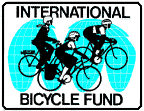Bicycle Advocacy:
Organizational Structure
WE WOULD LOVE
YOUR SUPPORT!
Our content is
provided free
as
a public service!
![]() IBF is 100%
IBF is 100%
solar powered
![]()
Organizing for Success: Elements to Look For
Because political strategies don't always transfer from one city to another or one culture to another, it is hard to say exactly what institutional structure and relationships will work best in all areas.
From our mostly northern hemisphere experience, the pattern of organizations and relationships that seem to have been the most stable for creating change towards a better bicycle infrastructure has four elements: a supportive political environment, bureaucrat trained in bicycle transport issues and design, an official constituted bicycle advisory board or committee, and a strong, savvy and knowledgeable bicycle advocacy non-governmental organization (NGO).
The institutions never line up perfectly or mesh flawlessly, that is why there is always more work to do. But, you might find a correlation between your success or failure to improve the infrastructure for bicycling in your community, and a road map for where you need to put your efforts, from an assessment of the performance of these four institutions:
Politicians (mayor, governor, legislatures, council members, alderpersons, etc), while perhaps not knowing the details of bicycle infrastructure, helps bring the funding and sets the priorities for the bureaucracy. The responsibility of informing the politicians on importance of non-motorized transport in the success of the mobility / accessibility agenda usually falls on the shoulders of the NGO.
Trained bureaucrats should help make public works project more bicycle friendly, or at least help minimize anti-bicycle projects from being implemented. But, bureaucracy tend to be too big to expect that every one with a project that might impact bicycling will be trained in the needs of bicyclist or for a "bicycle transport specialist" within the bureaucracy to know every project that is in the pipeline. The more bicycle-trained bureaucrats there are in local government, the institutionalized good bicycle facilities planning and implementation should be.
Bicycle Advisory Board (BAB) should be constituted so that they have authorization to look over the shoulder of the whole bureaucracy and press for a quality product for any project that might affect bicycling. The BAB main venue of activity is meetings, including big committee-of-whole formats with presentations from project managers, and smaller face-to-face formats with bureaucrats and politicians. Their activities tend to generate information that can be very useful for the activism of the NGO. Ideally there should be representatives from the NGO on the BAB.
Non-Governmental Organizations (NGO) are not constrained like the BAB. These are also sometimes referred to as "user groups" or "stake holders". They can do more community organizing, political demonstrations, press releases, letter-writing campaigns, and workshops, confront the executive (especially at election time) etc. The most visionary element is likely to be the NGO. While it has to be diplomatic and build and maintain respect for the causes it represents, it often has to PUSH, PULL and PRY the other elements of the structure.
The first thing the NGO might have to work on is getting this stature. We have also seen bicycle advocates in the government working to strengthen the NGO, so they had a strong public voice behind them when they wanted to push something on the bicycle agenda. Every community is a little different.
For hints on forming a NGO see www.ibike.org/encouragement/club.htm
IBF's Bicycle Bibliography / Reading List
Home | About Us | Contact Us | Contributions | Economics | Education | Encouragement | Engineering | Environment | Bibliography | Essay Contest | Ibike Tours | Library | Links | Site Map | Search
![]()
The International Bicycle Fund is an independent, non-profit organization. Its primary purpose is to promote bicycle transportation. Most IBF projects and activities fall into one of four categories: planning and engineering, safety education, economic development assistance and promoting international understanding. IBF's objective is to create a sustainable, people-friendly environment by creating opportunities of the highest practicable quality for bicycle transportation. IBF is funded by private donation. Contributions are always welcome and are U.S. tax-deductible to the extent allowed by law.
![]()
![]() Please write if you have questions, comment, criticism, praise or
additional information for us, to report bad links, or if you would like to be
added to IBF's mailing list. (Also let us know how you found this site.)
Please write if you have questions, comment, criticism, praise or
additional information for us, to report bad links, or if you would like to be
added to IBF's mailing list. (Also let us know how you found this site.)


